Public Opinion Poll: Do Utah Republicans Lean Libertarian?
Last week, FreedomWorks released the results of a new survey highlighting the libertarian trends with the Republican Party nationwide. In an effort to determine what these results look like within Utah, we performed an opinion poll using many of the same questions.
We surveyed 500 random registered Republicans in Utah on September 16, 2013 via an automated phone system. Sampled voters were contacted and administered a questionnaire. Half of respondents were contacted on a mobile phone, the other half on a landline. The margin of sampling error is ±4.38%.
Those wishing to perform their own analysis of the survey results may download the full data here. Questions? Contact us.
1. In politics today, do you consider yourself to be a conservative Republican, moderate Republican, Tea Party Republican, or libertarian Republican?

Here is the breakdown by age group:
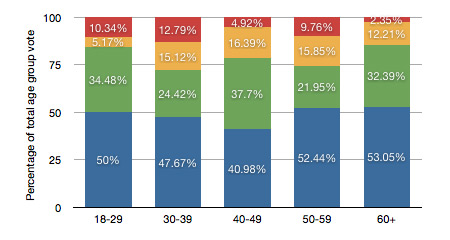
2. In general, which of the following are you most interested in: (ROTATED CHOICES) promoting individual freedom through lower taxes and reducing the size and scope of government; promoting traditional values, like traditional marriage and protecting the life of the unborn; OR promoting a strong national defense and the security of American interests at home and abroad.

Here is the breakdown by age group:
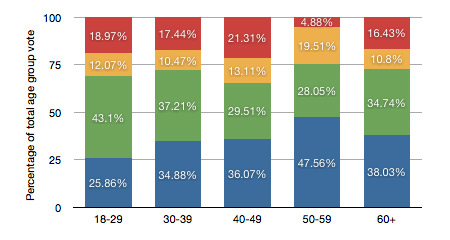
3. Some people think the government should promote traditional values in our society. Others think the government should not favor any particular set of values. Which comes closer to your own view: the government should promote traditional values; or the government should not promote any particular set of values.

Here is the breakdown by age group:
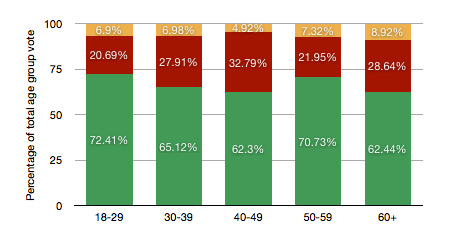
4. Consider a hypothetical primary election for Congress between two Republicans. Would you be more likely to vote for (ROTATED) a candidate who has more political experience and party leaders say is more likely to win, OR a candidate with less political experience but is viewed by both local activists and party leaders to have stronger conservative or libertarian principles?

Here is the breakdown by age group:
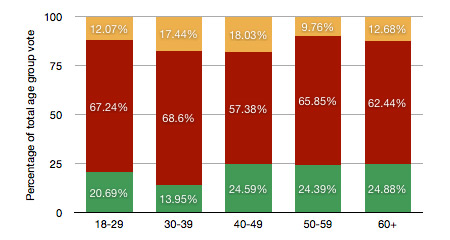
5. Would you consider yourself a strong libertarian, do you lean libertarian, or are you not a libertarian?

Here is the breakdown by age group:
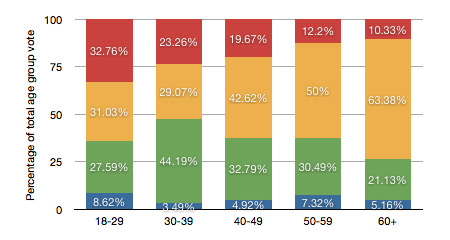
6. Generally speaking, libertarians believe individuals should be free to do as they like as long as they don’t violate another person’s rights, and that the government should keep out of people’s day-to-day lives. Based on this description, how much do you agree or disagree with the libertarian view?

Here is the breakdown by age group:
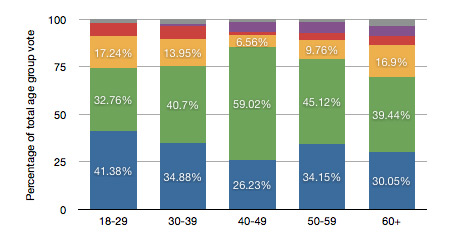
Analysis
At the outset of our analysis, it is first important to note that all respondents in this survey are registered Republicans. This survey therefore does not measure the total libertarian orientation of Utah voters, for registered Libertarians and libertarian independents are excluded. (Nearly 1/3 of Utah voters are independent or unaffiliated.)
The Tea Party has received much attention nationwide and in Utah in the past few years, yet only 13% of Republicans apply the label to themselves, whereas 50% call themselves a conservative Republican. Seven percent of Republicans chose the libertarian label.
In the nationwide poll, 5% of Republicans said they were strong libertarians and 16% said they lean libertarian. Among Utah Republicans, 6% said they were a “strong libertarian” (within the margin of error) and 29% said they lean libertarian—an interesting divergence from the national trend.
What’s most interesting is the last question, where rather than referring to the label “libertarian” (which many people have a misperception of or personal bias towards) we asked Republicans how they feel about the most fundamental point of libertarianism, from which all other policy positions extend. A majority 74% of Utah Republicans agree that “individuals should be free to do as they like as long as they don’t violate another person’s rights, and that the government should keep out of people’s day-to-day lives.” (58% of Republicans in the national poll agreed.) Only 9% of Utah Republicans disagreed, and the remainder had no position or were unsure.
This validates a longstanding suspicion regarding the degree to which predominantly conservative voters are comfortable associating with libertarian issues and labels. While a majority of Republicans were unwilling to apply the label to themselves, a strong majority expressed support for the most basic tenet of the libertarian political philosophy.
We have long felt that although it is easy to obtain support based on a general principle, voters generally are inconsistent in the application of that principle to any given set of policies. Voters say they support the free market, for example, yet most support policies and programs that violate basic market principles. There are many examples of this.
Examples from our other polls bear this out. Fifty percent of Republican voters in Utah support the state’s involvement in controlling the sale of alcohol. Over 60% oppose efforts to decriminalize polygamy—a practice that 69% of Republicans consider morally wrong. Seventy five percent of Republicans oppose general legalization of marijuana, and 32% want to criminalize alcohol and tobacco with the same penalties that currently exist for marijuana.
These inconsistencies were perhaps summarized in a question asked by both FreedomWorks and Libertas: Should government promote traditional values? In the national poll, 40% of Republicans said yes, and 52% said no. Among Utah Republicans, 65% said yes, and 27% said no. Clearly, Utah Republicans are comfortable with imposing their views through government—even though many of them claim to not want to interfere in others’ lives, as indicated in the last question.
We believe there is great opportunity in helping Republicans, and Utahns generally, to more consistently and accurately apply their professed principles to specific policies. The fact that 74% agree with the essence of our message is a welcome development.

